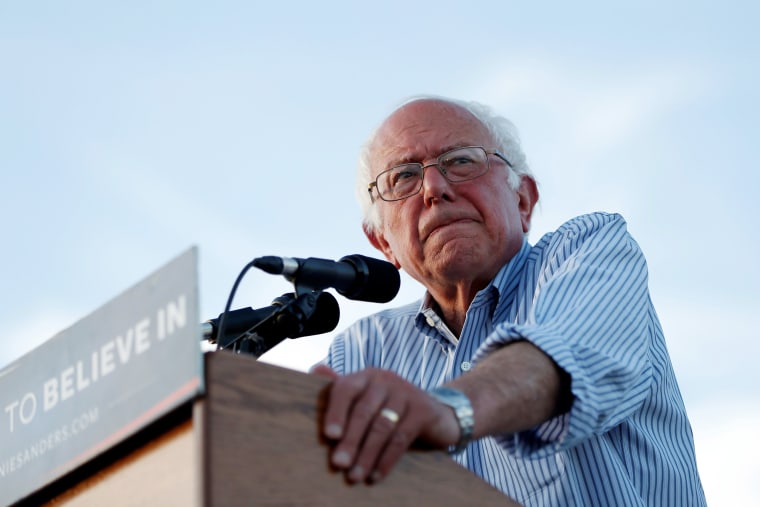ORLANDO, Fla. — In a major defeat during an otherwise fruitful process for him, Bernie Sanders failed to get strong language opposing the Trans-Pacific Partnership inserted in the draft Democratic platform at a party meeting here Saturday.
Instead, the committee approved an amendment backed by a large swath of labor unions that called for tough restrictions on trade deals, but did not explicitly oppose the trade pact with a dozen Pacific Rim nations that liberals say would hurt workers.
"We are proud to stand with our friends in organized labor in passing a strong amendment to the Democratic platform on all trade deals, including the TPP," said Clinton aide Maya Harris, who is quarterbacking her campaign's platform efforts.
Related: Democrats Add $15 Minimum Wage to Platform
Sanders will now have to decide whether he wants to use a parliamentary mechanism to push the issue to a fight on the floor of the Democratic National Convention later this month in Philadelphia.
"We are very disappointed," said Sanders top policy adviser Warren Gunnells. "The good news is that virtually everyone who spoke during the debate on trade made it clear that they opposed this unfettered free trade agreement."
Both Sanders and Hillary Clinton oppose the TPP, but the Obama administration supports it, and the desire to avoid embarrassing the president carried the day, with the labor unions acting as a political shield for the White House.
Delegates twice Saturday morning voted down stronger opposition language as Sanders supporters booed and chanted “sellout.” Some eventually walked out of the meeting entirely.
Many said they doubted Clinton's stated opposition to the TPP and saw her delegates' votes here as a sign she intends to backtrack during a potential vote on the TPP during the lame-duck session of Congress later this year. Harris strongly denied that, saying her boss opposes the TPP "before or after the election."
The actual terms of the debate were often obfuscated on Clinton's side, however, as no one speaking on behalf of the labor-backed amendment mentioned offending the president. Instead, they simply said their amendment went far enough or claimed adding anti-TPP language would make the plank too narrow, since it wouldn't mention future trade deals.
“We've had no speech here in favor of TPP, but we can't bring ourselves to say we oppose TPP,” said Sanders delegate Robert Kraig.
But it was clear as a string of trade union presidents lined up at the microphone to oppose the Sanders amendments that his forces were outmatched.
Sanders controls about 70 votes of the 187-member committee, with Clinton controlling about 100 and the remainder being appointees of the Democratic National Committee. Sanders needed roughly 20 extra votes to pass anything, but both the Clinton campaign and the DNC were whipping members to oppose stronger anti-TPP language, as a courtesy to Obama.
Most votes occurred along party lines, with a handful of defections on both sides depending on the vote.
Related: Democrats Go on Offense on Voting, Democracy
AFSCME President Lee Saunders, acting on behalf of pro-Clinton labor unions, which make up the vast majority of the labor movement, proposed the amendment that ultimately succeeded.
The 452-word amendment, which labor leaders felt went as far as possible without running afoul of the White House, lays out numerous restrictions desired for trade deals. But it does not oppose the TPP, leading to objection from Sanders’ team.
“We need to leave no doubts,” said Sanders surrogate Nina Turner, a former Ohio state senator.
Former NAACP Chairman Ben Jealous, another Sanders ally, tried to add a secondary amendment to Saunders’ that simply added the language “and that’s why we oppose the Trans-Pacific Partnership." It was voted down 106-74.
Sanders' side warned that Donald Trump could outflank Democrats on trade, claiming the Republican Party could include stronger language against the TPP than Democrats had in their platform.
A final Sanders amendment, proposed by activist Jim Hightower, failed 104-77.
The first draft of the platform, produced by 15-member working group, essentially punted on trade. That left plenty of room for non-Sanders forces to argue they had made major additions to the platform.
But after going all in on the clear anti-TPP language, it will be difficult for Sanders to spin the outcome as a victory.
He did, however, secure a major victory Friday in getting support for a $15 minimum wage added to the draft platform and will likely walk away with more concessions by the time the meeting concludes Saturday night. And that comes in addition to wins Sanders allies secured in the first draft.
Meanwhile, in a show of unity just as debate was kicking off on trade in Orlando, the Clinton campaign released a health care plan it created in coordination with Sanders’ campaign.
In a conference call with reporters, Sanders congratulated Clinton on the plan and praised it as an “extremely important initiative.”
Earlier in the day in Orlando, DNC chairwoman Debbie Wasserman Schultz pleaded for unity. “The only thing that can keep us from winning is if we lose sight of the fact that more unites us than divides us,” she said.
Sanders is expected to endorse Clinton on Tuesday in New Hampshire, taking a major step towards that goal.
But he still has to decide if he’ll force a floor vote on trade or other issues though at the convention through a so-called minority report process.
If he does, it could reopen this contentious issue on a much bigger stage.

